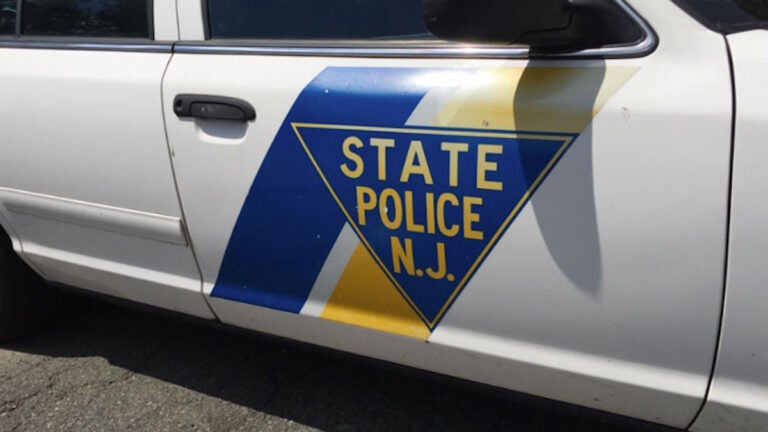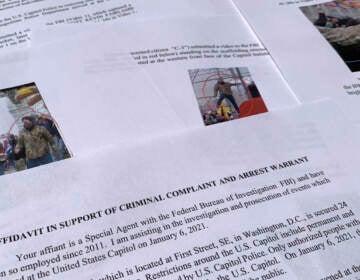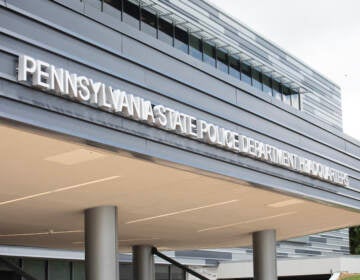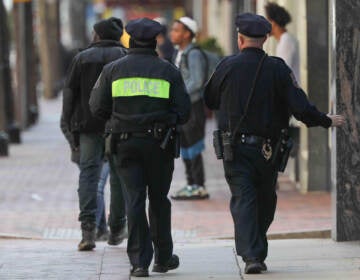In a first, N.J. details disciplinary penalties for police
Some 87 agencies in 19 counties reported at least one disciplinary action. Hundreds of law enforcement agencies reported no actions against officers.

New Jersey State Police car in Trenton, N.J. (Alan Tu/WHYY)
This story originally appeared on NJ Spotlight.
The first public look at the scope of how law enforcement managers discipline their own showed 211 occasions when officers forfeited time off or were demoted, suspended or fired for offenses ranging from violating social-media policies to aggravated assault.
The reports are the result of an order issued by former Attorney General Gurbir Grewal three weeks after the murder of George Floyd by a Minneapolis police officer, that law-enforcement agencies must post online information about all major disciplinary actions against officers.
Police unions filed a lawsuit seeking to block the release, which delayed it by about seven months, but the state Supreme Court unanimously upheld Grewal’s directive and he ordered that the information be released as of the end of day Monday.
The attorney general’s office consolidated the information from local departments into a report posted on its site Tuesday. The report lists the names, agencies and outcomes of major disciplinary actions taken between June 15 and Dec. 31, 2020, as well as a brief statement of the officer’s conduct that precipitated the suspension, demotion or termination.
Some 87 agencies in 19 counties reported at least one disciplinary action. Hundreds of law enforcement agencies reported no actions against officers. Dozens of others were listed as having provided no information to the state and it is unclear whether they had nothing to report or were late in making their information public. A spokesman for the acting attorney general said the office will be following up with those police departments.
Building ‘greater public trust’
Of the 203 officers listed — some for more than one action — almost a quarter were fired, 80% were suspended for more than five days (a handful were terminated after a period of suspension) and three were demoted. The average suspension lasted for almost 50 days. The lightest penalty faced by a few officials appeared to be a loss of accrued paid time off such as vacation days.
Acting Attorney General Andrew J. Bruck said these incidents reflect a small minority of the state’s law enforcement officials, but added that making this information public is important to both “build greater public trust” and promote “professionalism” among the ranks.
“The vast majority of New Jersey’s law enforcement officers serve the public with honor and integrity, doing the right thing day-in and day-out for the communities they serve, so I take no joy in putting this information out,” Bruck said in a statement. “Today, New Jersey takes an important step forward, joining the majority of U.S. states that disclose the identities of law enforcement officers found responsible for engaging in serious disciplinary violations. We are releasing this information not to shame or embarrass individual officers, but to provide the same type of transparency and accountability in policing that New Jersey mandates in other essential professions.”
The infractions noted in the reports were split between actions taken while on the job and incidents occurring off duty.
Officers were penalized for abusing sick leave, not showing up for work, excessive lateness, sleeping on duty, doing personal work while on duty and other work-related infractions. Others were disciplined for attempting to interfere in an investigation, tampering with public records, misuse of departmental computers, driving with a suspended license and making false statements. Some violations were related to the improper use of body-worn cameras. A number of officers failed drug tests. Several superior officers were cited for failing to properly supervise others.
A number of officers were disciplined for failing to follow COVID-19 protocols, including improper masking.
Several officials faced sanctions under the blanket term “conduct unbecoming an officer,” for infractions including aggravated assault, theft, drunk driving, domestic disputes and physical altercations.
Racist social-media posts
Social-media posts got a number of officials in trouble. Some reports of the social-media infractions were vague, described simply as violating departmental policies. Others included harassment in posts, liking a “reckless and inflammatory” post on Facebook, making “insensitive and distasteful social media posts,” and racist posts, including one who “reposted racial photographic images on social media of black males on the gallows surrounded by white males and stated ‘we need to bring this back.’” A handful of other officers were disciplined for expressing racist sentiments via email or in conversation.
Law enforcement officers faced severe discipline at several different types of agencies: universities, prosecutor and sheriff’s offices, municipal departments, as well as state police. Roughly a quarter were employed by the state Department of Corrections at prisons across the state.
This was the first time data on incidents was reported on such a scale; Grewal’s order calls for the information to be released annually. In the future, reports detailing all major discipline should be published no later than Jan. 31 of the following calendar year.
The release of disciplinary data is just the latest reform undertaken by the attorney general’s office. Grewal, who left the position last month to head up the enforcement arm at the Securities and Exchange Commission, made police reform a priority.
He issued 30 directives, plus additional guidelines and standards in his 3½ years on the job. Among the most significant were placing limits on the use of force by officers, an early warning system in all agencies to track and respond to internal-affairs complaints, use-of-force and civil actions against officers and new police training emphasizing de-escalation in responding to calls.
Most police officers are also required now to wear body cameras after Gov. Phil Murphy signed a law last November mandating the use of cameras by officers who deal with the public.
WHYY is your source for fact-based, in-depth journalism and information. As a nonprofit organization, we rely on financial support from readers like you. Please give today.







